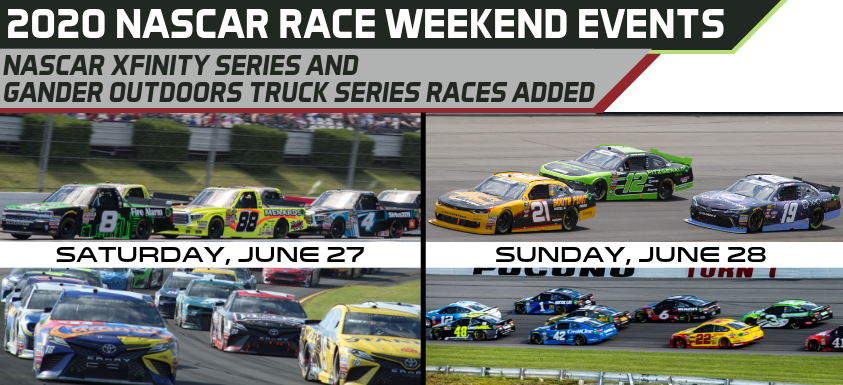Usually by this time in the year we’re complaining about Fox’s Nascar coverage, whining about the season being too long, and wondering what JGR driver is going to run away with the regular season. Instead, Nascar—and most of the world—has been stopped cold by the spread of the COVID-19 virus, aka the Coronavirus. Nascar joined the sports world by indefinitely postponing all races through May 3rd.
But where does that leave Nascar going forward?
Let’s see what we can figure out:
DID NASCAR ABSOLUTELY HAVE TO CANCEL THE RACES—HOW ABOUT HOLDING THEM WITH NO FANS? First of all, the races have not been “cancelled”—they’ve been postponed (at least for now). And yes, there was virtually no way Nascar could have raced under the conditions we all now live with. Even if they had TRIED to hold races without fans, there’s a small army needed to put on a race. Think of all the pit crews, road crews (mechanics and support staff), Nascar officials, safety workers, TV and radio production staff, and the drivers themselves. If one person gets sick they could possibly infect the entire garage—and that could very well lead to the actual cancellation of the entire season.
HOW CAN NASCAR WORK THE POSTPONED RACES INTO THE REMAINING SCHEDULE? The way I see it, there’s three viable options for Nascar to approach—here they are in order of practicality:
Least Practical—Extend the season into the winter. PROS—allows all races to have their own weekends. Least impact on Xfinity and Truck Series races. Best tv time windows. CONS—weather issues for northern tracks. Makes the season even longer than it already was. Puts Nascar head-to-head with football. Limits offseason time to work on the 2021 “Gen 7” car.
 |
| Ironically Nascar already had a Doubleheader Cup Series race weekend scheduled for Pocono this year. |
Moderately Practical—Make certain race weekends Doubleheaders. PROS—would likely allow season to end in early-November as scheduled. Would lower travel costs for teams by only going to tracks once this season. Plenty of marketing opportunities with the “double or nothing” aspect. CONS—extremely weather-sensitive—a rainy weekend could obliterate two Cup races. Leaves little room for Xfinity and Truck Series races. Could be limited TV windows with delayed NBA and NHL Playoffs and a condensed baseball season. How would tracks like Homestead and Atlanta that only have one weekend a year be worked in?
Most Practical—Run mid-week races. PROS—would likely allow season to end in early-November as scheduled. Could allow Xfinity and Truck Series races to be run if “shuffled” right. Easier to obtain TV windows in the mid-week. Mid-week racing has been a rumored goal of Nascar for years. CONS—limited TV audience away from weekends. Travel schedules would have to be considered. Harder to run mid-week (night) races as it gets colder. Lower attendance likely on Wednesdays as approached to Sundays. Logistics could prove to be impractical for big teams and impossible for small ones.
WHAT ELSE NEEDS TO BE DETERMINED BY NASCAR? Well, will Nascar follow in Formula 1’s footsteps and delay the implementation of the “Gen 7” car regulations for 2021? Also, what shape will a shortened season’s Playoff field take—more drivers, fewer races, or both? Furthermore, how will teams adjust their budgets with, in theory, less sponsorship money coming in due to delayed or, possibly, cancelled races? All this will have to be figured out.
IS NASCAR DOING ALL IT CAN? At the moment, it appears so. From closing the race shops to the public to putting on laid-back iRacing virtual races, Nascar is protecting its family while maintaining its spot in the public eye. While NFL free agency has dominated the sports world for the past few weeks, one could argue that Nascar is a small, albeit not forgotten, part of the sports fabric during this unprecedented time.

